Activiti学习之spring boot 与activiti整合
2020-12-13 03:28
声明:本文是springboot2.0的多项目构建,springboot2.0和spingboot1.5的配置是有出入的,构建项目之前请规范您的springboot版本,选择2.0以上。
一、在IDEA中使用工具创建SpringBoot + Gradle的父工程
new -> project ->gradle
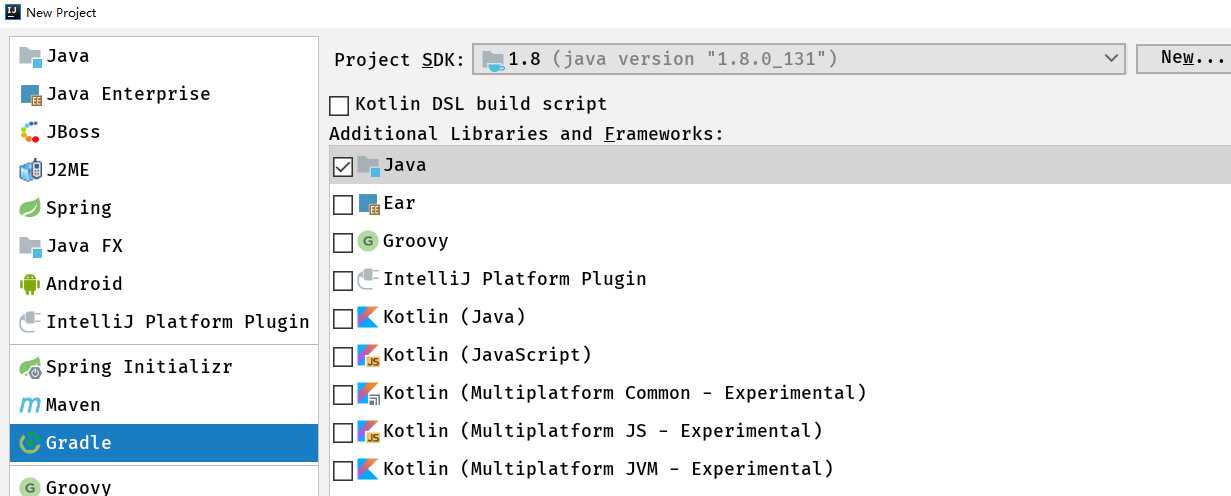

二、在父工程下新建叁个模块 dao service web
右键单击父工程 new -> module -> Spring Initializr -> type选项选中Gradle Project(其他视情况填写)
创建module的最后一步要注意,子模块最好在父工程的目录下,避免不必要的麻烦
创建每个模块的时候 有一个让你选择加载jar包的过程 你可以选也可以不选 我建议什么都不用 项目创建完毕 根据项目需求 手动在build.gradle目录下加入你需要的jar包
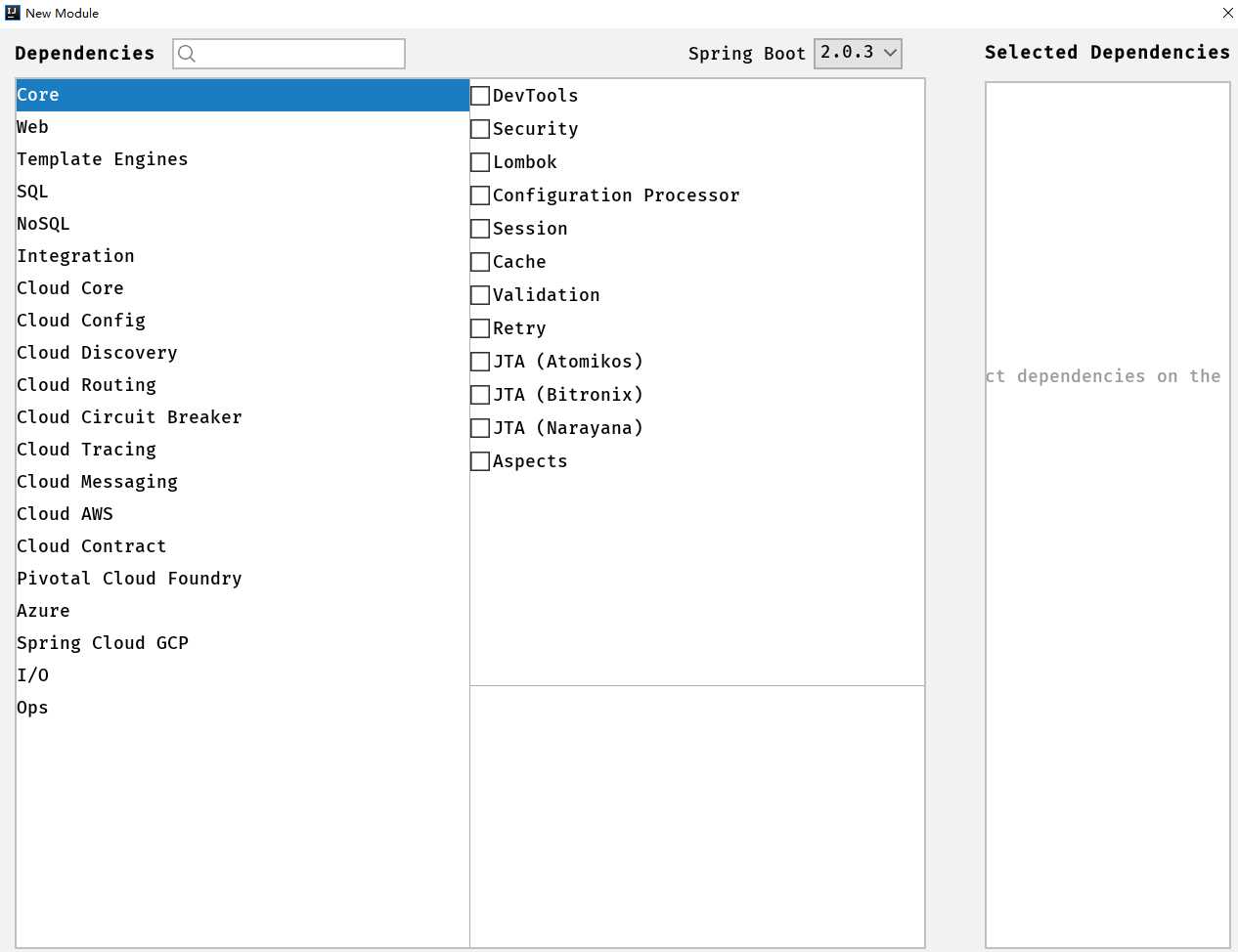

三、以此类推创建service模块和web模块 作为项目的子模块
四、重要的事情说三遍(很重要)
修改父项目 也就是sys(第一个创建的gradle项目)下的setting.gradle文件,加入
include ‘dao‘,‘service‘,"web"
此代码表示 dao ,service ,web 这三个项目是他的子项目 如果不加入 后面在父项目中定义的所有规范将毫无意义

五、父项目下bulid.gradle代码

allprojects { apply plugin: ‘java‘ apply plugin: ‘idea‘ group = ‘com.huyuqiang‘ version = ‘0.0.1-SNAPSHOT‘ //jvm(java虚拟机版本号)第一个是你项目使用的jdk版本 第二个是你项目运行的jdk版本 sourceCompatibility = 1.8 targetCompatibility = 1.8 } subprojects { ext { //版本号定义 springBootVersion = ‘2.0.3.RELEASE‘ } // java编译的时候缺省状态下会因为中文字符而失败 [compileJava, compileTestJava, javadoc]*.options*.encoding = ‘UTF-8‘ repositories { mavenLocal() maven { url "http://maven.aliyun.com/nexus/content/groups/public" } maven { url "https://repo.spring.io/libs-release" } mavenCentral() jcenter() } configurations { all*.exclude module: ‘commons-logging‘ } } //定义子项目dao的配置 project(‘:dao‘) { dependencies { compile( //redis缓存框架随便加的 自己项目中需要什么加什么 ‘org.springframework.boot:spring-boot-starter-data-redis‘ //‘org.springframework.boot:spring-boot-starter-jdbc‘, //‘org.mybatis.spring.boot:mybatis-spring-boot-starter:1.3.2‘ ) testCompile( ‘org.springframework.boot:spring-boot-starter-test‘, "junit:junit:4.12" ) } } //定义子项目service的配置 project(‘:service‘) { dependencies { //service依赖于dao compile project(":dao") compile( ‘org.springframework.boot:spring-boot-starter-web‘, ) testCompile( ‘org.springframework.boot:spring-boot-starter-test‘, "junit:junit:4.12" ) } } project(‘:web‘) { apply plugin: "war" dependencies { //web依赖于service compile project(":service") compile( ‘org.springframework.boot:spring-boot-starter-web‘ ) testCompile( ‘org.springframework.boot:spring-boot-starter-test‘, "junit:junit:4.12" ) // providedCompile( // "javax.servlet:javax.servlet-api:3.1.0", // "javax.servlet.jsp:jsp-api:2.2.1-b03", // "javax.servlet.jsp.jstl:javax.servlet.jsp.jstl-api:1.2.1" // ) } processResources{ /* 从‘$projectDir/src/main/java‘目录下复制文件到‘WEB-INF/classes‘目录下覆盖原有同名文件*/ from("$projectDir/src/main/java") } /*自定义任务用于将当前子项目的java类打成jar包,此jar包不包含resources下的文件*/ def jarArchiveName="${project.name}-${version}.jar" task jarWithoutResources(type: Jar) { from sourceSets.main.output.classesDir archiveName jarArchiveName } /*重写war任务:*/ war { dependsOn jarWithoutResources /* classpath排除sourceSets.main.output.classesDir目录,加入jarWithoutResources打出来的jar包 */ classpath = classpath.minus(files(sourceSets.main.output.classesDir)).plus(files("$buildDir/$libsDirName/$jarArchiveName")) } /*打印编译运行类路径*/ task jarPath { println configurations.compile.asPath } } /*从子项目拷贝War任务生成的压缩包到根项目的build/explodedDist目录*/ task explodedDist(type: Copy) { into "$buildDir/explodedDist" subprojects { from tasks.withType(War) } }

六、子项目dao中bulid.gradle代码

buildscript { ext { springBootVersion = ‘2.0.3.RELEASE‘ } repositories { mavenCentral() } dependencies { classpath("org.springframework.boot:spring-boot-gradle-plugin:${springBootVersion}") } } apply plugin: ‘java‘ apply plugin: ‘idea‘ apply plugin: ‘org.springframework.boot‘ apply plugin: ‘io.spring.dependency-management‘ group = ‘com.huyuqiang‘ version = ‘0.0.1-SNAPSHOT‘ sourceCompatibility = 1.8 repositories { mavenLocal() maven { url "http://maven.aliyun.com/nexus/content/groups/public" } maven { url "https://repo.spring.io/libs-release" } mavenCentral() jcenter() } dependencies { testCompile(‘org.springframework.boot:spring-boot-starter-test‘) }

七、子项目service中bulid.gradle代码

buildscript { ext { springBootVersion = ‘2.0.3.RELEASE‘ } repositories { mavenCentral() } dependencies { classpath("org.springframework.boot:spring-boot-gradle-plugin:${springBootVersion}") } } apply plugin: ‘java‘ apply plugin: ‘idea‘ apply plugin: ‘org.springframework.boot‘ apply plugin: ‘io.spring.dependency-management‘ group = ‘com.huyuqiang‘ version = ‘0.0.1-SNAPSHOT‘ sourceCompatibility = 1.8 repositories { mavenLocal() maven { url "http://maven.aliyun.com/nexus/content/groups/public" } maven { url "https://repo.spring.io/libs-release" } mavenCentral() jcenter() } dependencies { testCompile(‘org.springframework.boot:spring-boot-starter-test‘) }

八、子项目web中bulid.gradle代码

buildscript { ext { springBootVersion = ‘2.0.3.RELEASE‘ } repositories { mavenCentral() } dependencies { classpath("org.springframework.boot:spring-boot-gradle-plugin:${springBootVersion}") } } apply plugin: ‘java‘ apply plugin: ‘idea‘ apply plugin: ‘org.springframework.boot‘ apply plugin: ‘io.spring.dependency-management‘ apply plugin: ‘war‘ group = ‘com.huyuqiang‘ version = ‘0.0.1-SNAPSHOT‘ sourceCompatibility = 1.8 repositories { mavenLocal() maven { url "http://maven.aliyun.com/nexus/content/groups/public" } maven { url "https://repo.spring.io/libs-release" } mavenCentral() jcenter() } configurations { providedRuntime } dependencies { providedRuntime(‘org.springframework.boot:spring-boot-starter-tomcat‘) }

九、在web子模块下创建controller文件夹,文件夹下创建一个controller类,请看清楚我截图的包结构,如果包结构不对,启动项目的时候访问网页会报错(Whiteable Error Page) ),这是springboot有默认的包结构,如果你的包结构不对spring启动的时候是找不到
你的controller类的
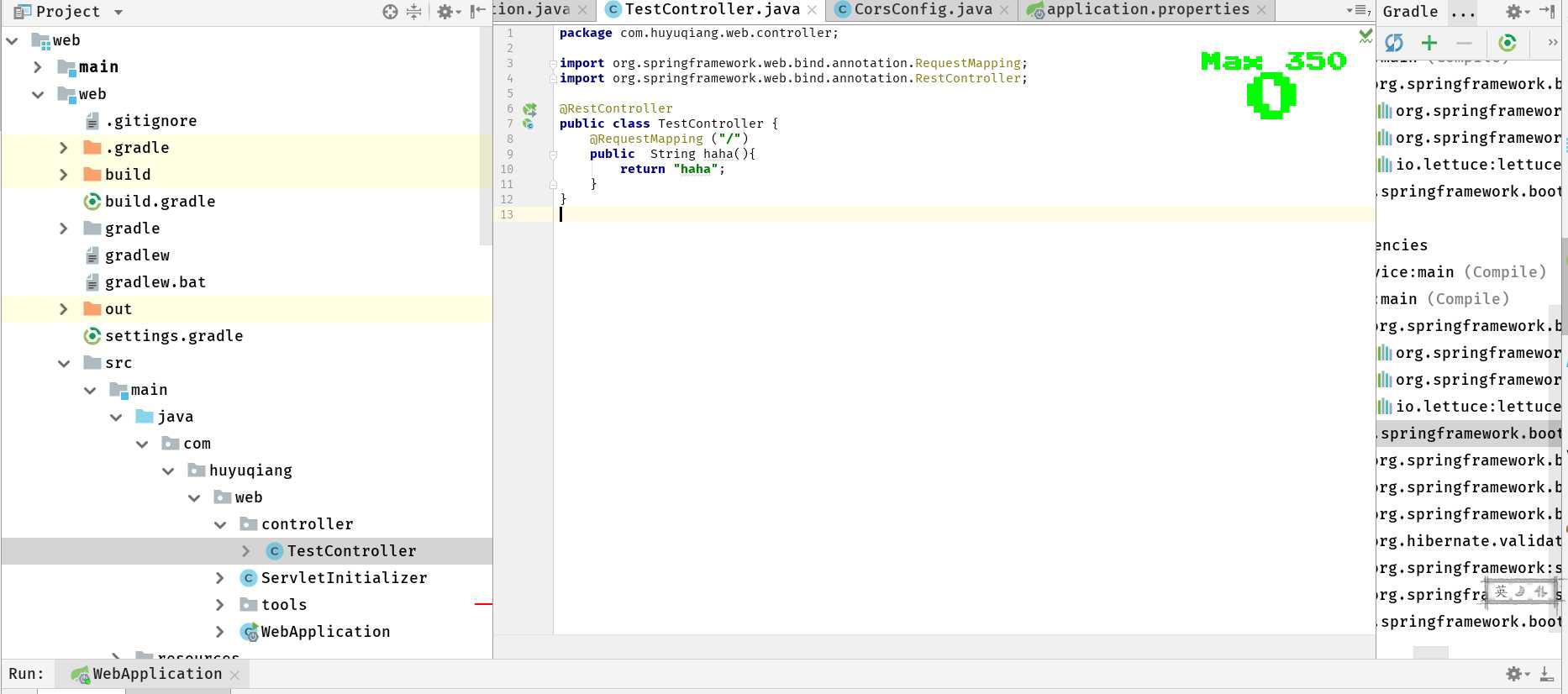
启动web子模块包下的的webapplication启动类,访问localhost:8080
重要提示:
如果你在项目中加入了data框架引用 例如 mybatis jdbc 等 你在第一次启动项目的时候如果没有配置数据源,tomcat会报错无法启动,提示你需要配置数据源。
十、打包:
在父工程目录下输入命令 gradle build
取出 web子模块下 build -> libs -> web-1.0.jar
java -jar 执行即可访问
十一、整合mybatis
逆向工程
一、添加配置文件
新建一个空的XML配置文件,这里以generatorConfig.xml为名,放在resources目录下mybatis文件中,没有mybatis文件夹自己建一个,顺便创建一个mapper文件夹等下要用来放xm映射文件。具体内容如下:

DOCTYPE generatorConfiguration
PUBLIC "-//mybatis.org//DTD MyBatis Generator Configuration 1.0//EN"
"http://mybatis.org/dtd/mybatis-generator-config_1_0.dtd">
connectionURL="${connectionURL}"
userId="${userId}"
password="${password}">

创建一个gradle.properties文件 代码如下:

# JDBC 驱动类名 jdbc.driverClassName=com.mysql.jdbc.Driver # JDBC URL: jdbc:mysql:// + 数据库主机地址 + 端口号 + 数据库名 jdbc.url=jdbc:mysql://10.0.0.88:3306/taotaodb?useUnicode=true&characterEncoding=utf8 # JDBC 用户名及密码 jdbc.username=root jdbc.password=huyuqiang # 生成实体类所在的包 package.model=com.huyuqiang.po # 生成 mapper 类所在的包 package.mapper=com.huyuqiang.dao # 生成 mapper xml 文件所在的包 package.xml=mapper

注意文件路径结构:
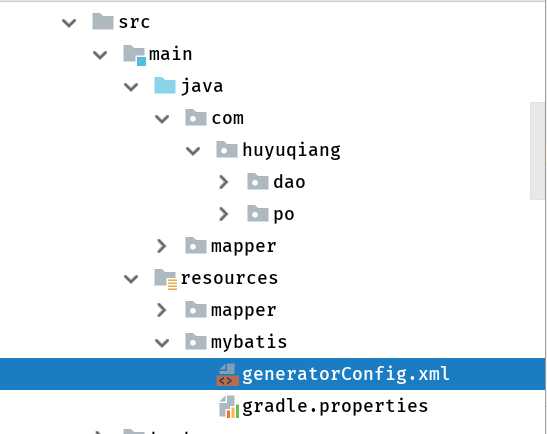
bulid.gradle文件代码如下:

//逆向工程方法 configurations { mybatisGenerator } dependencies { //逆向工程jar包 mybatisGenerator ‘org.mybatis.generator:mybatis-generator-core:1.3.2‘ mybatisGenerator ‘mysql:mysql-connector-java:5.1.38‘ mybatisGenerator ‘tk.mybatis:mapper:3.3.1‘ testCompile(‘org.springframework.boot:spring-boot-starter-test‘) } def getDbProperties = { def properties = new Properties() file("src/main/resources/mybatis/gradle.properties").withInputStream { inputStream -> properties.load(inputStream) } properties } //建立task并应用ant task mybatisGenerate { def properties = getDbProperties() ant.properties[‘targetProject‘] = projectDir.path ant.properties[‘driverClass‘] = properties.getProperty("jdbc.driverClassName") ant.properties[‘connectionURL‘] = properties.getProperty("jdbc.url") ant.properties[‘userId‘] = properties.getProperty("jdbc.username") ant.properties[‘password‘] = properties.getProperty("jdbc.password") ant.properties[‘src_main_java‘] = sourceSets.main.java.srcDirs[0].path ant.properties[‘src_main_resources‘] = sourceSets.main.resources.srcDirs[0].path ant.properties[‘modelPackage‘] = properties.getProperty("package.model") ant.properties[‘mapperPackage‘] = properties.getProperty("package.mapper") ant.properties[‘sqlMapperPackage‘] = properties.getProperty("package.xml") ant.taskdef( name: ‘mbgenerator‘, classname: ‘org.mybatis.generator.ant.GeneratorAntTask‘, classpath: configurations.mybatisGenerator.asPath ) ant.mbgenerator(overwrite: true, configfile: ‘src/main/resources/mybatis/generatorConfig.xml‘, verbose: true) { propertyset { propertyref(name: ‘targetProject‘) propertyref(name: ‘userId‘) propertyref(name: ‘driverClass‘) propertyref(name: ‘connectionURL‘) propertyref(name: ‘password‘) propertyref(name: ‘src_main_java‘) propertyref(name: ‘src_main_resources‘) propertyref(name: ‘modelPackage‘) propertyref(name: ‘mapperPackage‘) propertyref(name: ‘sqlMapperPackage‘) } } }

gradle重建一下,Tasks下的other中会出现mybatiGenerate
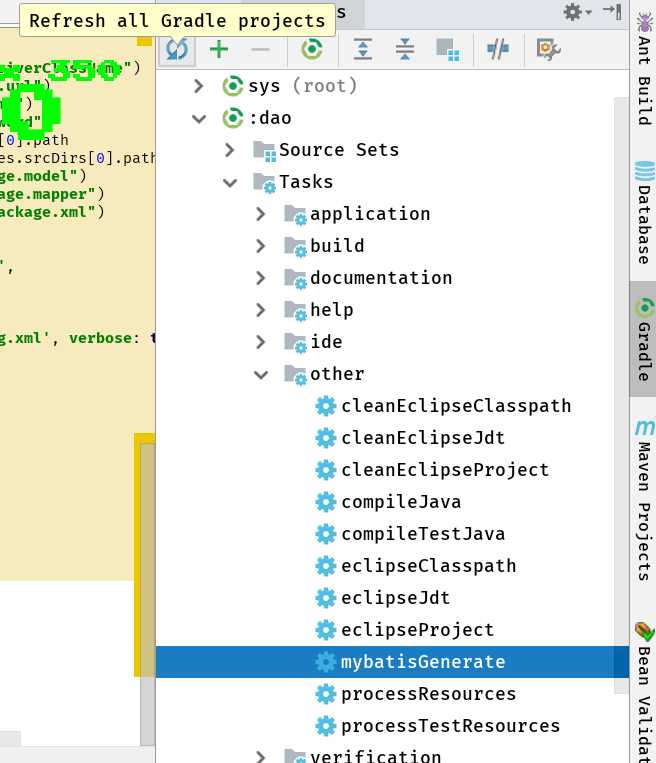
右键run,完成逆向工程。
1.父项目build.gradle文件里定义dao模块处添加依赖

project(‘:dao‘) { dependencies { compile( //redis缓存框架随便加的 自己项目中需要什么加什么 ‘org.springframework.boot:spring-boot-starter-data-redis‘, //jdbc ‘org.springframework.boot:spring-boot-starter-jdbc‘, //mybatis ‘org.mybatis.spring.boot:mybatis-spring-boot-starter:1.3.2‘, //阿里巴巴连接池 ‘com.alibaba:druid-spring-boot-starter:1.1.0‘, ‘mysql:mysql-connector-java:5.1.38‘ ) testCompile( ‘org.springframework.boot:spring-boot-starter-test‘, "junit:junit:4.12" ) } }

2.web子项目模块resources文件夹下applicationproperties文件加入以下内容,也可以不用properties文件,用yml文件,yml文件的格式会让人感觉很舒服,这里我就不多说了差距不大:

spring.datasource.url=jdbc\:mysql\://10.0.0.8\:3306/taotaodb?useUnicode\=true&characterEncoding\=gbk&zeroDateTimeBehavior\=convertToNull spring.datasource.username=root spring.datasource.password=huyuqiang spring.datasource.driver-class-name=com.mysql.jdbc.Driver spring.datasource.initialSize=5 spring.datasource.minIdle=5 spring.datasource.maxActive=20 spring.datasource.maxWait=60000

3.java配置代替传统的xml配置
创建一个类,此处名为mybatiConfig目录如下:
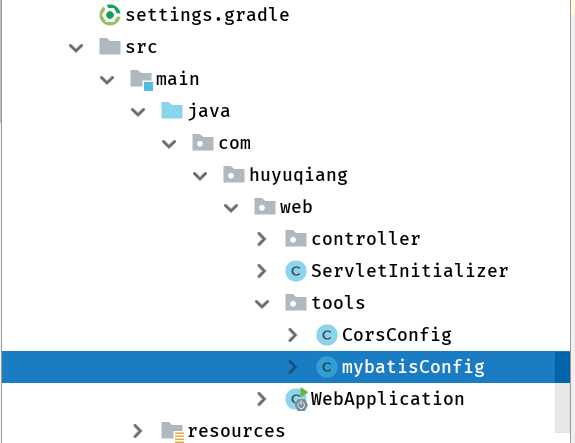
代码如下:

package com.huyuqiang.web.tools; import com.alibaba.druid.pool.DruidDataSource; import org.apache.ibatis.session.SqlSessionFactory; import org.mybatis.spring.SqlSessionFactoryBean; import org.mybatis.spring.annotation.MapperScan; import org.springframework.boot.context.properties.ConfigurationProperties; import org.springframework.context.annotation.Bean; import org.springframework.context.annotation.Configuration; import org.springframework.core.io.support.PathMatchingResourcePatternResolver; @Configuration /*告诉spring mybatis生成的dao所在的位置*/ @MapperScan("com.huyuqiang.dao") public class mybatisConfig { @Bean public SqlSessionFactory sqlSessionFactoryBean() throws Exception { SqlSessionFactoryBean sqlSessionFactoryBean = new SqlSessionFactoryBean(); sqlSessionFactoryBean.setDataSource(dataSource()); PathMatchingResourcePatternResolver resolver = new PathMatchingResourcePatternResolver(); ///告诉spring mybatis生成的mapper.xml所在的位置 sqlSessionFactoryBean.setMapperLocations(resolver .getResources("classpath:/mapper/*.xml")); return sqlSessionFactoryBean.getObject(); } @Bean //配置druid阿里的连接池 @ConfigurationProperties(prefix = "spring.datasource") public DruidDataSource dataSource() { return new DruidDataSource(); } }

注:scanBasePackages = "com.huyuqiang.*" 启动的时候
@SpringBootApplication 只会扫描当前包下的文件 因为是多模块项目 springboot并不知道你的service在什么地方,所以必须加。

@SpringBootApplication(scanBasePackages = "com.huyuqiang.*") public class WebApplication { public static void main(String[] args) { SpringApplication.run(WebApplication.class, args); } }

启动web子模块包下的的webapplication启动类,访问localhost:8080。
十二:整合activiti
我整合是把activiti生成的28张表和项目数据库的表放在一个数据库中
至于如何分开放在两个数据库中,说实在的能不能做到,可以,无非是两个数据源,配置多数据源切换
多数据源的切换springboot不是不能做,实现起来也不难,可是用起来就很不舒服,而且在管理事物上也
会出现问题,事物无法同步,其实我还是觉得多数据源这种问题尽量不要在spring中解决 还是应该放到
数据库那边 交给dba做分布式来的比较舒服,也更加正统,毕竟我是做代码层的,数据库仅限于一些sql
语言,对分布式等一些数据库层的定义语言知之甚少 也不敢妄自菲薄 只是说一下个人感想
言归正传 看看springboot2.0和activiti6.0的整合
父项目build.gradle加入jar包依赖
‘org.activiti:activiti-spring-boot-starter-basic:6.0.0‘
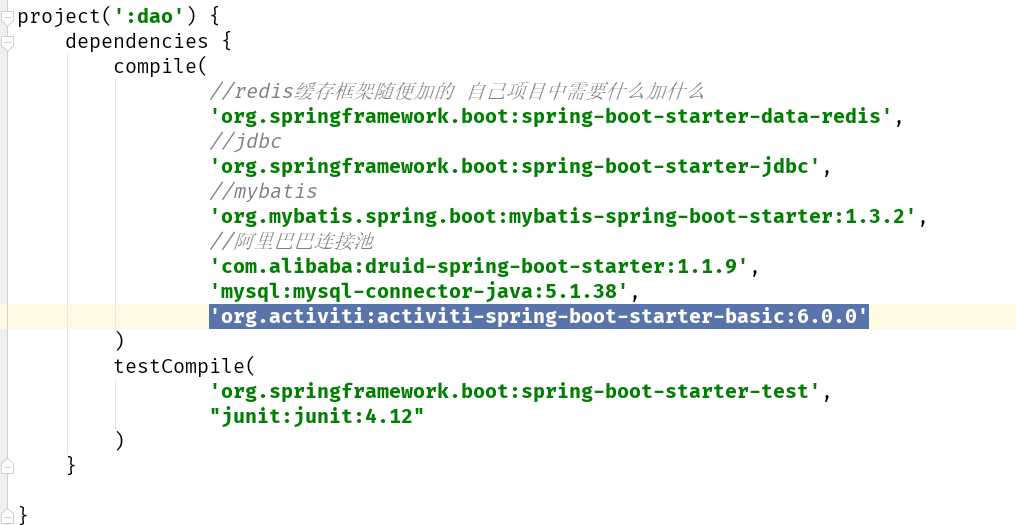
web子模块resources文件夹下创建文件夹processes文件夹,里面放入一个需要部署的bpmn流程文件,因为项目启动的时候springboot会去加载这个文件夹下的bpmn文件
完成自动部署
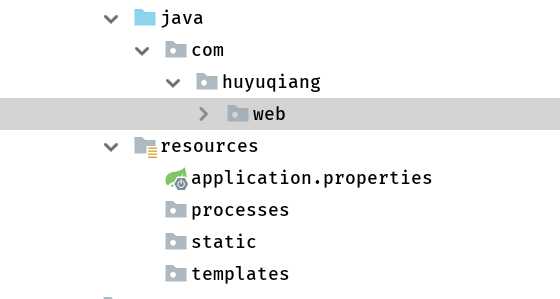
如果没有就会报错 如果不想让springboot自动部署流程
application.properties文件里加入一下两行代码:
spring.activiti.check-process-definitions=false
spring.activiti.database-schema-update=true

webapplication启动类里面代码如下

@SpringBootApplication(scanBasePackages = "com.huyuqiang.*",exclude = SecurityAutoConfiguration.class) public class WebApplication { public static void main(String[] args) { SpringApplication.run(WebApplication.class, args); } }

@SpringBootApplication(exclude = SecurityAutoConfiguration.class)剔除安全检查类,这个代码必须有不然会报一个“Error creating bean with name ‘requestMappingHandlerMapping‘”的错误
好了 就这么简单搞定了 启动直接可以用。
原文地址:https://blog.csdn.net/chq1988/article/details/75699792文章标题:Activiti学习之spring boot 与activiti整合
文章链接:http://soscw.com/essay/27671.html